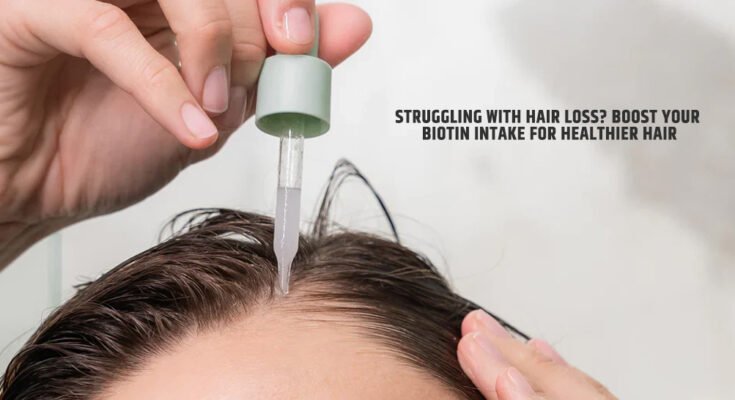Biotin and Its Role in Promoting Hair Health: A Complete Guide
Are you struggling with hair thinning or hair loss? One important factor that could be contributing to these issues is a deficiency in biotin, a vital vitamin that plays a key role in supporting healthy hair growth. Biotin, also known as vitamin B7, is a water-soluble B vitamin found in various foods and supplements. It is essential for metabolizing fats, carbohydrates, and proteins and plays a significant role in regulating cell signaling and gene activity. When biotin levels are insufficient, hair follicles can weaken, resulting in thinning, breakage, and even hair loss.
How Does Biotin Support Hair Growth?
Biotin is known for its ability to convert food into energy and, more importantly, to support the production of keratin. Keratin is the protein that constitutes the structure of hair, and without enough biotin, hair may become weak and prone to falling out.
Benefits of Biotin for Hair
- Encourages Hair Growth: Biotin stimulates hair follicles, which can promote the growth of new hair. It is thought to enhance the infrastructure of keratin, which is crucial for healthy, strong hair.
- Strengthens Hair: Biotin may improve the resilience of the hair shaft, reducing breakage and split ends. This leads to the appearance of thicker and fuller hair.
- Supports Overall Hair Health: Biotin aids in the metabolism of amino acids, the building blocks of proteins. Since hair is primarily made up of keratin, biotin’s involvement in protein synthesis helps maintain healthy hair.
- Prevents Hair Loss: While biotin deficiency is rare, insufficient biotin levels can contribute to hair loss. Biotin supplements can help prevent hair loss in individuals with a deficiency. However, it’s important to note that hair loss can have various causes, and biotin may not be a cure-all.
The Effects of Biotin on Hair Growth
The results from biotin supplementation or hair products containing biotin may take several months to become noticeable. Biotin contributes to hair health by stimulating follicles, improving hair strength, and supporting the overall hair structure. However, individual results vary, and it’s essential to consult a healthcare provider to address any underlying health issues before starting biotin supplementation.
Biotin-Rich Foods
- Eggs: Cooked eggs, particularly the yolk, are an excellent source of biotin. Raw egg whites contain an antinutrient called avidin that hinders biotin absorption, so it’s important to cook eggs thoroughly. A 50g serving of cooked eggs provides about 10 mcg of biotin.
- Salmon: Salmon is the seafood with the highest biotin content and is also rich in omega-3 fatty acids, which promote hair growth. A 85g serving of cooked salmon provides about 5 mcg of biotin.
- Sunflower Seeds: These seeds are a great source of biotin, with approximately 2.6 mcg per 20-gram serving.
- Avocados: A 28g serving of avocado contains around 1.8 mcg of biotin. They are also rich in healthy fats, which support overall health.
- Sweet Potatoes: A great vegetable source of biotin, sweet potatoes contain approximately 2.4 mcg per 125g serving.
- Mushrooms: Both canned and fresh mushrooms are rich in biotin. A 120g serving of canned button mushrooms provides about 2.6 mcg, while a 70g serving of fresh button mushrooms offers 5.6 mcg of biotin.
- Bananas: A small banana (about 105g) provides 0.2 mcg of biotin, and can be enjoyed on its own or added to smoothies.
- Almonds: Though not as high in biotin as other foods, almonds still offer a healthy dose of biotin, along with essential nutrients.
- Broccoli: A half-cup (45g) of raw, chopped broccoli contains 0.4 mcg of biotin. It can be enjoyed in a variety of dishes, from raw snacks to soups and casseroles.
The Risks of Excessive Biotin Intake
While biotin is essential for hair health, consuming excessive amounts of biotin can lead to potential side effects. High doses of biotin may interfere with certain lab tests, leading to inaccurate results. It is important to consult a healthcare provider before starting biotin supplementation, especially if you’re considering higher-than-recommended doses.
It’s always a good idea to prioritize natural food sources for biotin rather than relying solely on supplements.
Conclusion
Incorporating biotin-rich foods such as eggs, salmon, sunflower seeds, avocados, sweet potatoes, mushrooms, bananas, almonds, and broccoli into your diet can provide the nutrients needed for healthier hair growth. While biotin supplements may help those with deficiencies, a balanced diet, proper hair care, and overall health practices are essential for maintaining vibrant and strong hair. Remember, biotin’s role in hair health is just one piece of the puzzle—overall wellness contributes to the best results.








